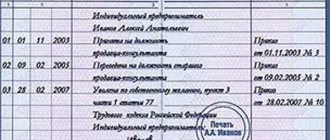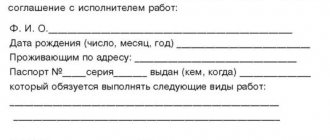lori-0000772579-bigwww.jpg
Related publications
Article 58 of the Labor Code of the Russian Federation provides conditions for both temporary and permanent employment of workers. A fixed-term employment contract can be concluded with an employee for a certain period of time, if there are appropriate conditions for this, provided for in Art. 58 and 59 of the Labor Code of the Russian Federation.
Part 1 of Article 59 of the Labor Code of the Russian Federation states that the conclusion of an employment contract on a temporary basis can be initiated by the employer only if it is not possible to conclude an agreement with the employee for an indefinite period, due to the special conditions of the work and its nature. The conclusion of a fixed-term employment contract with pensioners is permitted in accordance with Part 2 of Art. 59 of the Labor Code of the Russian Federation only with the personal consent of the pensioner himself. Before you sign a fixed-term employment contract for a certain period of time, it is worth remembering that according to Part 2 of Art. 58 of the Labor Code of the Russian Federation, such an agreement, concluded without any valid reasons, will be considered in judicial practice as unlimited.
https://youtu.be/pc5o4JJFJoE
Features of terminating a fixed-term employment relationship with a beneficiary
Part 3 of Article 80 of the Labor Code of the Russian Federation establishes the position: if it is impossible to continue working, in particular upon retirement, the administration is obliged to satisfy the pensioner’s request for dismissal without fourteen days of service and dismiss him on a date that he independently chooses.
When applying for dismissal, the pensioner must indicate the appropriate reason. If the senior citizen does not do this, then in case of absenteeism, he may be fired for absenteeism.
Controversial issues of dismissal of a pensioner in judicial practice
Judicial practice contains an interesting example. A pensioner, who has been in this status for several years, sent a statement in which he indicated the date of dismissal, attached a copy of his pension certificate, sent it by mail and decided not to go to work anymore. The administration sent him a telegram, asking him to explain the reasons for his absence. The employee replied that he considered himself fired by the date he indicated, because... is a pensioner. The administration regarded this behavior of the beneficiary as a disciplinary offense and fired him as a truant. The court supported the administration.
The dismissal of a pensioner occurs at the initiative of the employee.
By making a record of dismissal in the work book under clause 3, part 1 of art. 77 of the Labor Code of the Russian Federation, the reason for dismissal should be indicated by adding the phrase “in connection with retirement . This may seem like reinsurance, but this entry will not be superfluous. The legislator does not specify exactly whether an employee has the right to leave one or more times without working for this reason.
Judicial practice on the dismissal of a pensioner without service
Judicial practice believes that the only time a pensioner can quit is without working for two weeks. When registering a dismissal, take into account this feature: an employee has the right to resign due to retirement once, but it is not absolutely necessary that this will happen immediately after the pension is issued.
If there is no mention of dismissal due to retirement in the work book, then the court may regard this as the fact that the employee has not yet exercised this right. And in the example indicated in the paragraph above, the court already recognizes the actions of the administration as not complying with the law.
Thus, a fixed-term employment contract for pensioners is a right, not an obligation for participants in labor relations. Objective reasons and grounds, other than the very fact of accepting the pensioner, are not required, for which the joint expression of the will of the parties is sufficient.
Remember: an employer cannot insist on urgency in the relationship, nor can it refuse to hire you.
How to transfer a pensioner to a fixed-term employment contract
Transferring an employee from a permanent employment contract to a temporary one due to the onset of his pension rights is unacceptable. Otherwise, it will be regarded as an attempt by the employer to evade legislative guarantees to its employees.
In the event that a pensioner quit of his own free will, submitting a corresponding application to the employer, and was subsequently re-employed, then the employer has the right to draw up a fixed-term employment contract with the consent of the pensioner himself.
To draw up a fixed-term contract, the following documents are required:
-military ID (for those liable for military service);
-education document;
- application for admission (not included in the mandatory list according to the Labor Code).
The registration of a temporary employment contract with a pensioner is carried out by order of the manager (form T-1).
Fixed-term employment contract with a pensioner:
Dismissal of a pensioner due to age
A dismissal order is issued based on the fact that the contract has expired (and the corresponding notice of its expiration) or, for example, a resignation letter submitted by an employee. The order is issued no later than the last day of work of the temporary pensioner.
It is necessary to make an appropriate entry in the work book and issue it to the employee on the last day of work (after receiving the signature of the person being dismissed in the work book, the work book, and the personal card).
On his last working day (Part 1 of Article 140 of the Labor Code of the Russian Federation) a temporary employee must receive all standard payments upon termination of a fixed-term employment contract (salary, compensation for unused vacation, etc.).
Summary
- Is a pensioner required to enter into an annual employment contract with the employer?
- Is it possible to conclude a fixed-term employment contract with a pensioner in a budgetary institution.
- For how long should an employment contract be concluded with retirees at an enterprise?
- Is it legal to conclude an employment contract with a pensioner without being included in the work book?
- Is it possible to renew an open-ended employment contract into a fixed-term one with a pensioner?
- How to quickly terminate an employment contract with a pensioner?
- Are there any special features when concluding an employment contract with a pensioner?
- Employment contract with the appraiser
- Sample employment contract with an employee
- Employment contract with the employee
- Employment contract with employer
- LLC employment contract
Questions
1. Is a pensioner obligated to annually enter into an employment contract with the employer?
1.1. Pensioners enter into an employment contract on a general basis. The contract may be indefinite, or it may be urgent, indicating the basis for urgency and the duration of the contract.
1.2. No. Not necessary. The employment contract can be extended, if this condition is provided for in the main contract, for the next term. See the contract.
This is important to know: How to correctly extend a fixed-term employment contract for an indefinite period: sample application
1.3. If you work constantly, then the employment contract must be concluded for an indefinite period. The employer's actions are unlawful; you can complain to the state labor inspectorate.
1.4. If the employment contract is of an open-ended nature, then there is no need to renew it annually. If it's urgent, then it's necessary. But the presence of several fixed-term contracts in a row is grounds to believe that it has become of an indefinite nature.
2. Is it possible to conclude a fixed-term employment contract with a pensioner in a budgetary institution.
2.1. Hello. Possible by agreement. Article 59 of the Labor Code of the Russian Federation A fixed-term employment contract is concluded: for the duration of the duties of an absent employee, for whom, in accordance with labor legislation and other regulatory legal acts containing labor law norms, a collective agreement, agreements, local regulations, and an employment contract, the place of work is retained;
for the duration of temporary (up to two months) work;
to perform seasonal work, when, due to natural conditions, work can only be carried out during a certain period (season);
with persons sent to work abroad;
for carrying out work that goes beyond the normal activities of the employer (reconstruction, installation, commissioning and other work), as well as work related to a deliberately temporary (up to one year) expansion of production or the volume of services provided;
with persons entering work in organizations created for a predetermined period or to perform a predetermined job;
with persons hired to perform obviously defined work in cases where its completion cannot be determined by a specific date;
to perform work directly related to practice, vocational training or additional professional education in the form of an internship;
in cases of election for a certain period to an elected body or to an elective position for paid work, as well as employment related to the direct support of the activities of members of elected bodies or officials in state authorities and local self-government bodies, in political parties and other public associations;
with persons sent by employment services to temporary work and public works;
with citizens sent to perform alternative civil service;
in other cases provided for by this Code or other federal laws.
By agreement of the parties, a fixed-term employment contract may be concluded:
with persons entering work for employers - small businesses (including individual entrepreneurs), the number of employees of which does not exceed 35 people (in the field of retail trade and consumer services - 20 people);
with age pensioners entering work, as well as with persons who, for health reasons, in accordance with a medical certificate issued in the manner established by federal laws and other regulatory legal acts of the Russian Federation, are allowed to work exclusively of a temporary nature;
with persons entering work in organizations located in the Far North and equivalent areas, if this is related to moving to the place of work;
to carry out urgent work to prevent disasters, accidents, accidents, epidemics, epizootics, as well as to eliminate the consequences of these and other emergency circumstances;
with persons elected through a competition to fill the relevant position, conducted in the manner established by labor legislation and other regulatory legal acts containing labor law norms;
with creative workers of the media, cinematography organizations, theaters, theatrical and concert organizations, circuses and other persons involved in the creation and (or) performance (exhibition) of works, in accordance with the lists of works, professions, positions of these workers, approved by the Government of the Russian Federation Federation, taking into account the opinion of the Russian Tripartite Commission for the Regulation of Social and Labor Relations;
with managers, deputy managers and chief accountants of organizations, regardless of their legal forms and forms of ownership;
with persons receiving full-time education;
with crew members of sea vessels, inland navigation vessels and mixed (river-sea) navigation vessels registered in the Russian International Register of Vessels;
with persons applying for part-time work;
in other cases provided for by this Code or other federal laws.
3. For how long should an employment contract be concluded with retirees at an enterprise?
3.1. Article 59 of the Labor Code of the Russian Federation allows employers to enter into fixed-term employment contracts with pensioners. Duration - by agreement.
3.2. Hello! There are no restrictions on the period for pensioners in organizations
4. Is it legal to conclude an employment contract with a pensioner without being included in the work book?
This is important to know: Open-ended employment contract for an indefinite period (sample for 2020)
4.1. Illegal if this is the main place of work. An entry in the work book is made after five days of work.
4.2. An employment contract without being entered into the book is indeed illegal, but you can enter into an agreement for the provision of services, contract, etc., i.e. formalize civil legal relations.
5. Is it possible to renew an open-ended employment contract for a fixed-term one with a pensioner?
5.1. Hello. Yes, you can re-register with the employee’s consent.
6. How to quickly terminate an employment contract with a pensioner?
6.1. Recommend what I would write according to my “own desire”...))
7. Are there any special features when concluding an employment contract with a pensioner?
7.1. Dear Marina. Part 2 of Article 59 of the Labor Code of the Russian Federation provides for the possibility of concluding a fixed-term employment contract (by agreement of the parties) with age pensioners entering work. In this case, the employee and the employer are not bound by any obstacles and can enter into either a fixed-term employment contract or an indefinite employment contract. That is, the condition on the urgency of the work is determined by agreement of the parties. And the employer no longer has the right to insist on concluding a fixed-term employment contract. When concluding fixed-term employment contracts with old-age pensioners, as well as with persons who, for health reasons, are allowed to work exclusively of a temporary nature, the following must be kept in mind. In this case, old-age pensioners are considered only those persons who have reached the age entitling them to receive an old-age pension and who have been assigned such a pension. Only under these conditions can a fixed-term employment contract be concluded with an old-age pensioner. In itself, reaching retirement age, if a pension has not been assigned, is not grounds for concluding a fixed-term employment contract with a citizen. A medical report on the need to provide temporary work can only be issued by those bodies that are granted such a right - medical and social examination institutions. It should be especially emphasized that this provision provides for the possibility of concluding a fixed-term employment contract with age pensioners entering work. Changing an employment contract concluded for an indefinite period to a fixed-term employment contract with working pensioners is carried out on a general basis. With respect, Timoshenko Vladimir Andreevich.
8.1. You can’t call it anything other than lawlessness. 1. The dismissal of an employee at the initiative of the employer (except for the case of liquidation of an organization or termination of activities by an individual entrepreneur) is not allowed during the period of his temporary disability and while on vacation (Article 81 of the Labor Code of the Russian Federation). This also applies to a fixed-term employment contract. 2. The certificate of incapacity for work must be paid in full until October 15, 2019 inclusive. This day will be the day of your dismissal. 3. You have all the grounds to file a complaint with the State Tax Inspectorate and the prosecutor's office. Good luck.
9. My mother is retired, but works as a nurse in a clinic. From October she will be transferred to an employment contract! Question: how will this affect the size of the pension?
9.1. No it won't affect
10. An agreement for the provision of paid services was concluded between the individual entrepreneur and a pensioner, indicating a period and remuneration was paid to him monthly, there was no employment contract, but the accountant in the tax reports omitted these payments as wages and deducted insurance contributions as for a full-time employee. As a result, all regional social surcharges were withdrawn from him where he was registered at his place of residence. How to fix the situation?
10.1. No way, at least as long as the pensioner works officially. There was no need to draw up a formal contract. If a civil law contract was officially concluded, then the employer was simply obliged to pay all taxes and contributions for the retired employee (except for contributions to the Social Insurance Fund), regardless of the fact that this is not an employment contract.
11. A working pensioner (old-age pension) works in a municipal institution (organized according to the Labor Code of the Russian Federation), when concluding a GPC agreement with another organization, will he lose the amount of the pension he pays?
11.1. Dear site visitor! He won't lose it.
12. Can a pensioner working under an employment contract additionally enter into a civil service contract with another organization?
12.1. Yes maybe. Part-time work is permitted by labor legislation.
13. In accordance with changes in legislation, I have the right to take 2 days for medical examination (I am a pensioner). The collective agreement contains a clause about providing 1 day for medical examination. Do I have the right, based on the new amendment to the Labor Code introduced by Law No. 353-FZ of October 3, 2018? and a clause in the collective agreement, write an application to provide me with 3 days to undergo a medical examination while maintaining my average earnings.
This is important to know: Employment contract with a legal adviser (sample)
13.1. You have the right to 2 days according to the Labor Code on days agreed upon with the employer. The employer may refuse to allow you to use the 3rd day. Because he will believe that his duty will be fulfilled. If the collective agreement contained a reference that the specified day could be provided in addition to the established Labor Codes, then no questions would arise. However, according to the meaning of the collective agreement, additional benefits are indicated. In this connection, we can conclude that you are also entitled to a 3-day period as an additional benefit to the TC benefits. Labor Code of the Russian Federation Article 41. Content and structure of the collective agreement. A collective agreement, taking into account the financial and economic situation of the employer, may establish benefits and advantages for employees, working conditions that are more favorable in comparison with established laws,
other regulatory legal acts, agreements.
13.2. Three days is too much, Nadezhda. This is not the case when you can get two packs of beautiful and tasty Caesar dumplings in one well-known discount store for the price of one, and in addition, use a social discount card to deduct another 10% from a successful purchase. Two days - get a medical examination without fear or reproach. But not more. Good luck.
Structure and content
Article 57 of the Labor Code of the Russian Federation regulates the availability of the following information:
- Full name of the person being employed and the name of the organization receiving the employee (full name of the employer as a legal entity).
- Passport details of the employer (individual) and employee.
- If the contract is signed not by the employer personally, but by a person replacing him, then a document is required - the basis.
- Employer's TIN.
- Date and place of conclusion of this agreement, sealed with personal signatures.
For its part, the employer is obliged to include in the contract the following conditions:
- actual place of work;
- labor function (what specific duties are within the competence of this employee);
- work start date;
- date of termination of the employment contract and grounds for concluding a fixed-term contract;
- wages, various additional payments and allowances. If provided, incentive payments;
- operating mode;
- provided that the work involves harmful or dangerous working conditions, guarantees of compensation are necessary;
- the nature of the employee’s labor functions;
- compulsory social insurance;
- working conditions.
If any of the above information was not included, this cannot be grounds for declaring the document invalid. just need to make additions or draw up an annex to the agreement .
Features of fixed-term and unlimited-term employment contracts with pensioners
Today the situation is such that it is quite difficult for citizens of retirement age to find a job. Employers prefer to hire young employees with the prospect of more stable and long-term cooperation. Because of this, most older people in need of employment take any job offered to them, including seasonal ones.
A feature of seasonal work, or any other temporary vacancies, is the conclusion of a fixed-term employment contract with employees, after which the employer can quickly and without any problems part with the temporary employee. Such relationships between employee and employer are possible only on a reciprocal basis. The employer does not have the right to force his employees to draw up a fixed-term contract and, if the fact of coercion is proven in court, the fixed-term contract will be transformed into an open-ended one.
Also, an urgent TD has the following number of features that distinguish it from a regular one:
- An employer does not have the right to assign a probationary period to an employee if an urgent TD has been issued between them and its duration does not exceed 2 months.
- A probationary period may be appointed if all interested parties agree with its introduction.
- When drawing up the STD, the reason that served as the basis for its execution is indicated.
- The duration of the STD should not be longer than 5 years, unless otherwise provided by law.
- If the contract does not indicate the period of its validity, such a document is classified as unlimited. It follows that you should not forget to indicate the exact duration of the agreement between the employee and his employer.
- Upon expiration of the STD, the employer can issue another fixed-term employment contract with the pensioner. But do not forget that abuse of such a right may be punishable. If the court proves that the employer intentionally executed the STD, he may be fined, and the document will be reclassified as permanent.
Otherwise, the STD does not differ from a regular employment contract and is drawn up in accordance with established rules.
The state does not provide for the introduction of special working conditions for citizens applying for TD on an indefinite basis, even if they are retired. In this case, the TD will be no different from the usual one.
Is it necessary to renew the contract with an employee who has reached retirement age?
A pensioner is a person who receives payments for:
- old age (currently, in general, from 55 years old for women, 60 years old for men);
- disability;
- length of service;
- loss of a breadwinner.
The maximum age for work in certain positions is established for the fields of education (Article 332 of the Labor Code), civil service (Article 25.1 of the Federal Law of July 27, 2004 N 79), and heads of medical organizations (Article 350 of the Labor Code of the Russian Federation, Federal Law of July 29, 2017 N 256). This means that changing the conditions of a TD only on the basis of age (except for the specified categories) can be qualified by the court as corresponding discrimination, which is prohibited (Article 3 of the Labor Code). Therefore, re-conclusion of a TD without the consent of the employee based on his retirement age is not required. This conclusion is confirmed by the Determination of the Constitutional Court of the Russian Federation dated May 15, 2007 N 378-O-P. It states that the employer does not have the legal right to re-register a permanent TD for a fixed-term one (or terminate it), due to the employee’s retirement age and the assignment of a corresponding payment to him.
IMPORTANT! To retire in old age, in addition to reaching a certain age, you need to go through a certain procedure. Its rules are established by Order of the Ministry of Labor of Russia dated November 17, 2014 N 884n. Thus, retirement age itself, without proper paperwork, changes little for a person.
Subject composition of the contract
Only a person who has reached retirement age and receives a pension assigned to him can be considered a pensioner. The following cannot be considered pensioners:
- persons receiving disability or survivor benefits;
- persons who, although they have reached retirement age, have not received a pension.
Thus, the subjects of an employment contract with a pensioner will be:
- an employee who has reached retirement age and is receiving a pension;
- employer.
Possibilities
Pensioners include citizens who have reached the age limit (men are 60 years old, and women are 55) and who, in accordance with the law, have been assigned a pension.
If the pension is assigned for other reasons (disability, etc.), the citizen cannot be an old-age pensioner. The same as in the case when he reached the required age, but the pension was not issued.
Article 3 of the Labor Code of the Russian Federation states that every person has the right to work and self-realization and cannot be limited in their rights or encouraged due to age. Based on this,
pensioners have the same rights in employment as other citizens
.
https://www.youtube.com/watch{q}v=dKJTsXfvALc
Although often their qualifications and experience put them in a more advantageous position. Moreover, this category of people is less competitive and picky about working conditions.
A pensioner works under an employment contract both on an open-ended and fixed-term basis. In the first case, concluding an employment contract with an old-age pensioner is no different from applying for a job to other citizens.
In the second case, there are mandatory conditions, if not met, the organization may suffer damage in the form of fines and other sanctions.
Termination of an agreement
A fixed-term employment contract with a pensioner can be terminated either by agreement of the parties, or on the basis of expiration of the contract, or unilaterally.
When resigning at his own request, the pensioner writes a statement to the employer. The law does not provide for a mandatory two-week period of work for a pensioner.
In case of dismissal on the initiative of the administration, the pensioner must be sent a corresponding warning 2 months before the day of the proposed dismissal.
What does an employer need to know?
Let's look at some circumstances and situations that may arise and what you need to pay attention to.
- You cannot be fired because of age . When concluding open-ended employment contracts with pensioners, the employer must understand that he does not have the right to dismiss a person because of his age if the elderly employee regularly goes to work, does not show up to the workplace drunk and there are no other reasons for dismissal provided for by the Labor Code. legislation for an ordinary employee.
- It is important to talk about the conditions when concluding a contract . It is necessary to inform the employee in advance that vacation and sick leave are not paid.
- You cannot terminate an open-ended contract and enter into a fixed-term contract upon reaching retirement age . In accordance with Part 1 of Art. 5.27 of the Code of Administrative Violations, an organization may receive a fine for violating labor and labor protection laws.
- For a fixed-term contract for seasonal work, it is necessary to provide vacation or compensation at the rate of 2 working days per month of work . If the employer did not provide leave to the pensioner (for example, there was an emergency, and the short term of the contract expired during this time), compensation still must be paid, since the employee has the right to claim this and can prove it in court.
- You cannot insist on a fixed-term employment contract . Restricting an employment contract with a pensioner by force is unacceptable. The employer does not have the right to insist on concluding a fixed-term contract if the volume of work to be done and working conditions allow concluding a contract for an indefinite period. If it is proven in court that a person of retirement age was forced to enter into a fixed-term contract, this contract may be recognized as unlimited (Clause 13 Resolution of the Plenum of the Supreme Court of the Russian Federation dated March 17, 2004 No. 2).
- Not wanting to employ a pensioner for an indefinite period, the employer cannot employ him several times in a row with the same job function as before . The company can be fined in the amount of 30,000 to 50,000 rubles and, as punishment, the organization’s activities can be suspended for up to 90 days (Part 1 of Article 527 of the Code of Administrative Offenses of the Russian Federation).
- A probationary period can be established and specified in the contract . This is possible, since pensioners are not included in the list of persons for whom a test for employment is not established (Part 4 of Article 70 of the Labor Code of the Russian Federation). However, such a period can only be established by agreement (Part 1 of Article 70 of the Labor Code of the Russian Federation). Otherwise, it will be considered that the pensioner was hired without a probationary period, and he can prove in court his right to continue working even if he fails the test.
- It is possible to hire a pensioner on a part-time basis in certain situations . The employer can initiate this mode of work only temporarily - for a period of up to six months, if the company is threatened with massive layoffs (Part 5 of Article 74 of the Labor Code of the Russian Federation).
A work team filled with employees of different ages is a condition for a warm family atmosphere and continuity. Retired workers can perform labor functions on an equal basis with young people, and also take on work that is less interesting to young people, which in any case will benefit the common cause.
https://youtu.be/69tfrnpfJ-s
Dismissal
Upon retirement, the employee has the right to refuse to work, but should not be forced to do so.
There is no mention in the Labor Code or other regulatory documents that the age limit can serve as a reason for dismissal, but for many employers it is. But the procedure for terminating a contract is no different from the dismissal of non-retired employees.
When resigning at his own request, the pensioner writes an application addressed to the employer indicating the reason (at his own request), the date (the day the application was written) and signed personally by the employee himself.
The next day begins a two-week period that must be worked out.
Upon expiration of the period, the citizen is given a work book with a record of dismissal and a link to the article under which he was fired (in this case, Article 80 of the Labor Code).
The issuance of documents (including labor documents) must be made on the day of dismissal.
If the employee does not show up for them, then you can either send him a notice of receipt of the work book, or send it by mail. It must be sent by registered mail with notification.
Upon dismissal at the initiative of the employer, the citizen is given a notice of dismissal.
in 2 months
. Registration in the manner prescribed
Article 84.1 of the Labor Code
. After the expiration of the period, according to the same scheme, the employee must be given all documents about work.
The organization must indicate the correct reason for dismissal, otherwise the employee (and pensioners are especially active due to fears of not being hired again) can challenge his dismissal in court and, if successful, he must be reinstated in his previous position with payment of “downtime” and moral compensation damage.
So, when concluding an employment contract with citizens of retirement age, the employer benefits greatly by receiving a competent employee with extensive experience behind him, often willing to work at the expense of his personal time.
https://www.youtube.com/watch{q}v=hxOlo28UbY0
But pensioners do not have any special benefits and are accepted on the same basis as other categories of citizens.








